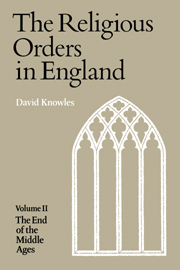Book contents
- Frontmatter
- Contents
- Preface
- List of Abbreviations
- Part One The Historical Framework
- Chap. I The opening of the period
- Chap. II Monks and canons at the university, 130c–1450
- Chap. III Patrons and architects: Ely and Gloucester
- Chap. IV Portraits of monks
- Chap. V Monks and friars in controversy
- Chap. VI Trends in speculation: Ockhamism, justification and grace
- Chap. VII Criticism of the religious in the fourteenth century
- Chap. VIII The spiritual life of the fourteenth century
- Chap. IX Developments within the orders: I
- Chap. X Developments within the orders: II
- Chap. XI The fortunes of the Cluniac houses and the alien priories
- Chap. XII The loosening of discipline
- Chap. XIII King Henry V
- Chap. XIV More portraits of monks
- Chap. XV The second century of visitation, 1350–1450
- Chap. XVI The spiritual life of the fifteenth century
- Part Two The Institutional Background
- Appendix I Chaucer's monk
- Appendix II Henry V and the Westminster recluse
- Appendix III Regulars as bishops
- Bibliography
- Index
Chap. XVI - The spiritual life of the fifteenth century
Published online by Cambridge University Press: 28 January 2010
- Frontmatter
- Contents
- Preface
- List of Abbreviations
- Part One The Historical Framework
- Chap. I The opening of the period
- Chap. II Monks and canons at the university, 130c–1450
- Chap. III Patrons and architects: Ely and Gloucester
- Chap. IV Portraits of monks
- Chap. V Monks and friars in controversy
- Chap. VI Trends in speculation: Ockhamism, justification and grace
- Chap. VII Criticism of the religious in the fourteenth century
- Chap. VIII The spiritual life of the fourteenth century
- Chap. IX Developments within the orders: I
- Chap. X Developments within the orders: II
- Chap. XI The fortunes of the Cluniac houses and the alien priories
- Chap. XII The loosening of discipline
- Chap. XIII King Henry V
- Chap. XIV More portraits of monks
- Chap. XV The second century of visitation, 1350–1450
- Chap. XVI The spiritual life of the fifteenth century
- Part Two The Institutional Background
- Appendix I Chaucer's monk
- Appendix II Henry V and the Westminster recluse
- Appendix III Regulars as bishops
- Bibliography
- Index
Summary
The fifteenth century gave birth in England to no one who might continue the line of spiritual and mystical writers that had given such distinction to the previous age. Margery Kempe, whatever judgement may be passed on her, and however great her familiarity with the English mystical writers, is clearly of another vintage. Yet there is abundant evidence, from the Book of Margery Kempe, from the survival of manuscripts, and from incidental references, that the three great writers of the fourteenth century—Richard Rolle, the author of The Cloud of Unknowing, and Walter Hilton—continued to form the standard reading of those who desired instruction in the ways of the spirit. It is, however, remarkable that, with few exceptions, all the surviving manuscripts of these authors come either from the libraries of the Carthusians and Bridgettines, or from the collections of devout lay folk. It is as if the monasteries of black and white monks clung to the traditional writers of the past, Cassian, Bernard, the Victorines and the rest, even though the devotional climate of the age had changed so greatly.
Of the spiritual life of the older orders and friars, indeed, we know next to nothing in this century. There is, however, one somewhat enigmatic manifestation which deserves mention: the race of Westminster recluses. Here, at the heart of what must always have been one of the most distracted and least secluded of communities, provision was by long tradition made for a recluse who had been and indeed still was, a monk of the house.
- Type
- Chapter
- Information
- Religious Orders Vol 2 , pp. 219 - 226Publisher: Cambridge University PressPrint publication year: 1979



